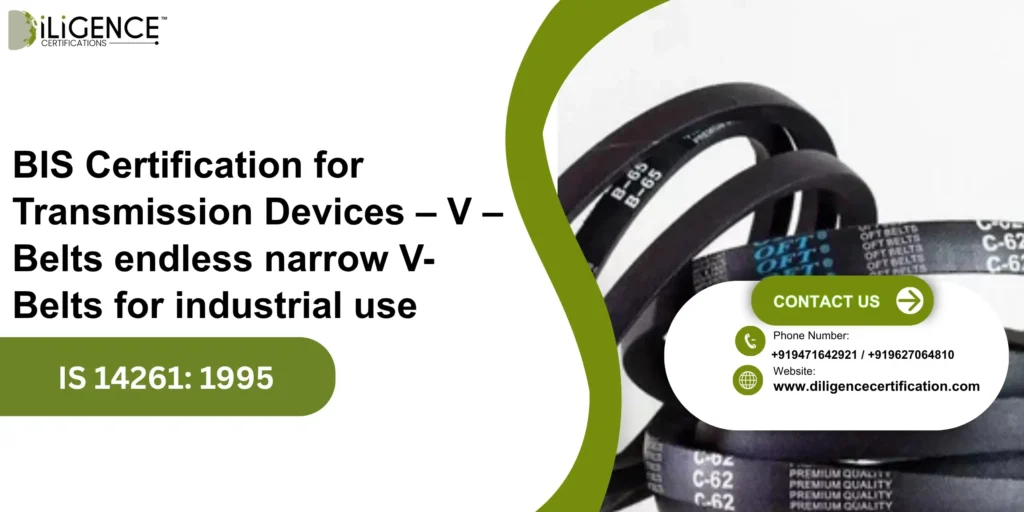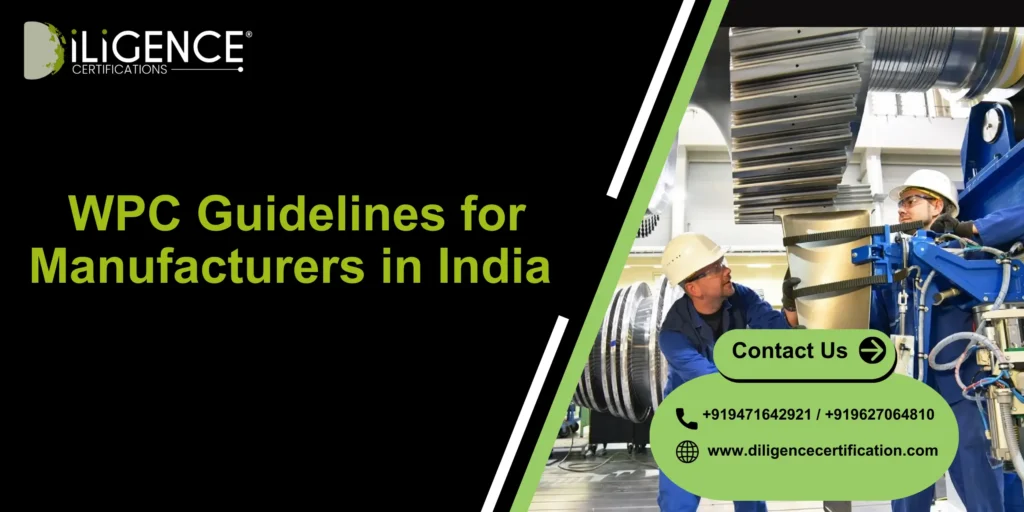- Ensures V-belts comply with IS 14261:1995, confirming safety, strength, and performance.
- Provides the ISI mark, building market trust and meeting legal requirements in India.
- Opens doors to government tenders, exports, and industrial contracts.
- Protects manufacturers from penalties, product rejection, and credibility loss.
- Diligence Certification offers complete support — from testing to documentation and licence renewal.
Introduction
A mid-sized rubber and polymer components manufacturer in Pune recently lost a major supply order from a public-sector engineering firm. The issue was straightforward — they had not obtained BIS certification for their V-belts in accordance with IS 14261:1995. The purchaser insisted on the ISI-marked BIS Certification for V-belts to guarantee the safety of the product and standard performance.
This circumstance is not unusual. There are hundreds of belt manufacturers in India operating with no level of reliable BIS licensing. Mostly, these companies don’t recognize its importance under rejection of certain tenders, heavy penalties, and while losing serious credibility in industrial markets.
The process for getting BIS Certification for V-belts for Industrial Use, means that device products will be designed to the standard for legal use, will bolster trademarks, and will give them access to institutional & large-scale export markets. For manufacturers working towards long term sustainability and recognition, BIS compliance is no longer negotiable – it is a mandatory benchmark.
What is IS 14261:1995?
IS 14261:1995 is a standard endorsed by the Bureau of Indian Standards (BIS) that specifies technical, performance and safety requirements for BIS Certification for V-belts for industrial power transmission systems.
It specifies material properties, construction, dimensional tolerances, and conduct performance tests of BIS Certification for V-belts to operate safely and effectively under high-load industrial situations.
Key provisions of IS 14261:1995 include:
- Material Specifications:
Defines suitable rubber compounds, tensile cords, and fabric reinforcements to ensure strength, elasticity, and resistance to wear and heat. - Design & Dimensions:
Standardizes cross-sectional profiles, length tolerance, and pulley compatibility to prevent slippage and uneven load distribution. - Performance Testing:
Evaluates tensile strength, elongation, adhesion between plies, and heat resistance under dynamic load conditions. - Safety & Durability:
Ensures that belts can operate for extended periods without delamination, cracking, or dimensional distortion.
In short, compliance with IS 14261:1995 gives manufacturers and buyers confidence that their industrial V-belts are standardized, safe, and reliable for continuous mechanical use.
Why BIS Certification for V-belts for Industrial Use is Crucial
Assures Safety and Reliability
Industrial V-belts transfer power from rotating shafts with high tension.Employee injuries can occur or costly gearbox failures could happen if the belt is poorly made and it snaps, slips or “frays” due to high heat.
BIS certification assures that every belt has met applicable test standards for tensile strength, This will reduce risks and ensure performance increases consistently.
Legal Compliance in India
Under the BIS Act, 2016, it is mandatory to obtain BIS certification for products listed under compulsory registration.
Selling uncertified V-belts may lead to penalties, product seizures, or legal action. A BIS license confirms full legal compliance, protecting manufacturers from enforcement risks.
Builds Market Credibility
The ISI mark is widely recognized across industries as a symbol of trust and quality. OEMs, engineering companies, and public sector buyers prefer ISI-marked belts, ensuring steady demand for certified products.
Eligibility for Government and Industrial Tenders
Many tenders from PSUs and large corporations specifically require BIS-certified products. Without certification, manufacturers are automatically disqualified from participating.
Certification provides a distinct market advantage and expands access to both domestic and export opportunities.
Standardized Quality Control
The BIS-certified batch is rigorously tested for tensile strength, heat aging, and adhesion.
Manufacturers must maintain their own internal quality control procedures in accordance with BIS standards to stay in compliance and keep a consistent high quality product.
Protects Brand Reputation
Certification communicates a manufacturer’s commitment to safety, reliability, and technical quality. It helps avoid complaints, warranty claims and product failures
Understanding the ISI Mark
The ISI mark on a V-belt indicates that:
- The product meets the parameters set out in IS 14261:1995.
- It has been subjected to performance, tensile, and dimensional testing in a BIS-approved facility for every inspection.
- The manufacturing facility operates under a regular company certification quality management system reviewed for compliance by the BIS.
- Only licensed manufacturers may use the ISI mark therefore it truly carries the credibility of being “safe and compliant”.
From the purchaser’s and industry user’s perspective, the ISI belt assures reasonable performance, is designed to a standard, and assures that
Importance and Benefits of BIS Certification
| Benefit | Description |
| Ensures Product Quality | V-belts tested for tensile strength, adhesion, and performance under load. |
| Builds Customer Trust | ISI-marked products reflect durability and reliability. |
| Legal Requirement | Mandatory under the BIS Act, 2016 for listed industrial products. |
| Safety Assurance | Prevents equipment failure and workplace hazards. |
| Market Advantage | Eligibility for government tenders and export markets. |
| Avoids Penalty | Protects against fines and license revocation. |
| Brand Reputation | Demonstrates compliance and quality commitment. |
| Export Facilitation | Increases acceptance in international markets. |
| Customer Satisfaction | Consistent product quality improves loyalty. |
| Supports National Standards | Aligns with “Make in India” and Atmanirbhar Bharat objectives. |
Eligibility Criteria for BIS Certification
Manufacturers applying for BIS certification for industrial V-belts must meet the following criteria:
- Must be a registered legal entity (Company, LLP, or Proprietorship).
- Should operate a functional manufacturing facility producing V-belts.
- Must maintain internal testing and quality control as per IS 14261:1995.
- Should employ qualified technical staff for process supervision.
- Must permit BIS officials to inspect the factory, documents, and production setup.
Only Indian manufacturers or authorized Indian representatives of foreign producers are eligible to apply for the BIS license under the standard.
Step-by-Step BIS Certification Process
- Identify Applicable Standard:
Confirm that your V-belt models correspond to IS 14261:1995 specifications. - Online Application:
Register on the Manak Online Portal (https://www.manakonline.in) and submit your manufacturing, product, and GST details. - Product Testing:
Send samples of V-belts to a BIS-recognized laboratory for detailed testing — including tensile, adhesion, and heat resistance tests. - Factory Inspection:
BIS officers conduct a site inspection to verify manufacturing capability, equipment, and quality systems. - Evaluation of Reports:
BIS reviews the laboratory results and inspection findings for compliance. - Grant of License:
Upon approval, the manufacturer is issued a BIS License and may use the ISI mark on their V-belts. - Renewal:
The license is valid for two years and can be renewed with updated documentation, testing, and inspection compliance.

Documents Required for BIS Certification
| Category | Required Documents |
| Company Proof | Incorporation Certificate, GST, MSME/Udyam Registration |
| Factory Details | Factory Layout, Machinery List, Process Flow Chart |
| Quality System | Internal Quality Records, Calibration Certificates |
| Product Testing | Lab Test Reports confirming IS 14261:1995 compliance |
| Technical Details | Product Specifications, Raw Material Data, Design Drawings |
Proper documentation ensures that the BIS application is processed without delays or rejections.
Validity and Renewal of BIS Licence
| Point | Details |
| Initial Validity | 2 years from date of issue. |
| Renewal Period | Can be renewed for up to 5 years at a time. |
| Renewal Timing | Apply at least 3 months before license expiry. |
| Renewal Requirements | Updated test reports, production proof, and renewal fees. |
| Inspection During Renewal | BIS may inspect the facility again for ongoing compliance. |
| If Renewal is Delayed | Delay may cause suspension or cancellation of license. |
| After Renewal | Manufacturer continues to use ISI mark on approved products. |
Timely renewal avoids business interruptions and preserves a company’s tender eligibility.
Common Challenges During BIS Certification
Insufficient Paperwork: Absence of information about the factory or testing reports can push approval timelines.
Non-Conformance to Testing: If the tensile or adhesion testing fails, we need to redesign and retest.
Issues during factory inspection: If we don’t have enough detail regarding quality control or documentation of processes, we may get a rejection.
Testing delays: Sometimes labs are overbooked, causing testing timelines to be extended.
Delays in renewal: Missing a renewal deadline could cause a suspension of the license.
Limited experience: by consultants could result in poor preparation of the documentation, increasing the possibility of a rejection.
Small manufacturers: may have a hard time with the cost of test and inspection.
Technical misunderstandings: with regard to the interpretation of the requirements in IS 14261:1995 can put you out of compliance.
Having an experienced BIS consultant on your project can greatly reduce these issues and provide a quicker and seamless certification process.
Cost of BIS Certification
| S.No | Cost Component | Details |
| 1 | Application Fee | Payable during online submission; covers processing. |
| 2 | Product Testing Fee | Charged by BIS-approved labs; varies by belt type and test scope. |
| 3 | Factory Inspection Fee | Charged for BIS officer’s travel and inspection. |
| 4 | License Fee | Based on production capacity and validity period. |
| 5 | Renewal Fee | Paid every 2 years for license continuation. |
Actual costs depend on the product category, number of variants tested, and lab location.
Why Choose Diligence Certification
Diligence Certification is a reliable BIS certification consultancy with extensive experience in providing assistance to manufacturers to gain compliance for mechanical, polymer and industrial products.
- Expert Assistance:
End-to-end support for BIS certification under IS 14261:1995 — from document preparation to license grant. - Faster Turnaround:
We coordinate directly with BIS-recognized labs and officials, ensuring no unnecessary delays. - Complete Documentation Support:
Our team prepares all factory, QC, and testing records accurately to meet BIS audit expectations. - Compliance Review:
We analyze product design, raw materials, and existing test results to pre-identify gaps before formal submission. - Trusted by Manufacturers:
Numerous V-belt and rubber component manufacturers rely on Diligence Certification for compliance and credibility enhancement. - Post-Certification Support:
Assistance continues even after license issuance — for renewals, inspections, and future product variations.
Conclusion
Obtaining BIS Certification for Industrial V-belts (IS 14261:1995) is considered necessary for every manufacturer, from a standpoint of safety, compliance, and integrity, both locally and internationally.
It protects your brand, increases trust for your customers, and is a requirement for supplying to government and industry contracts.
With Diligence Certification, manufacturers can experience a streamlined, reliable process — from application to inspection and renewal — backed by expert consultants who understand every nuance of the BIS system.
Get your V-belts certified today and secure your place among India’s most trusted industrial brands.
Frequently Asked Questions
What is the BIS Certification for V-belts?
BIS Certification indicates that the V-belts have been certified with regard to IS 14261:1995 safety, strength, and performance requirements.
Is BIS Certification a requirement for V-belts in India?
Yes, BIS Certification is required for listed industrial products under BIS Act 2016.
Which standard is applicable for V-belts?
IS 14261:1995 specifies the requirements for industrial V-belts.
Who may apply for BIS Certification?
Only Indian manufacturers, or authorized representatives of foreign manufacturers may apply for BIS Certification.
What is the validity for BIS license?
The BIS license is issued with 2 years validity and may be renewed for a total of 5 years.
Which tests are done for V-belts?
The certification testing includes tensile strength, adhesion testing, and heat resistance performed by BIS Laboratories.
What benefits are provided with BIS Certification?
BIS Certification provides confidence, certification that the products are safe, allows the producer to participate in tenders, and does not expose the producer to liabilities.
How does Diligence Certification help?
Diligence Certification will assist the manufacturer from testing to documentation through to renewal of BIS license.
Which documents do I need to provide for BIS Certification?
Documents required include details about the factory, test reports, records relating to quality, and specifications for products.
How long does it take for documentation to get BIS Certification?
Normally it may take a total of 4 to 6 weeks depending on testing and inspection timelines.








 BIS Certification
BIS Certification
 CDSCO
CDSCO
 CPCB
CPCB
 LMPC
LMPC
 WPC Approval
WPC Approval
 Global Approvals
Global Approvals
 TEC
TEC
 ARAI
ARAI
 BEE
BEE
 ISO Certification
ISO Certification
 DGCA Certification
DGCA Certification
 NOC For Steel
NOC For Steel



















 Business Registration
Business Registration















 Legal Services
Legal Services
 Trademark Registration
Trademark Registration
 Copyright Registration
Copyright Registration
 Patent Registration
Patent Registration















































